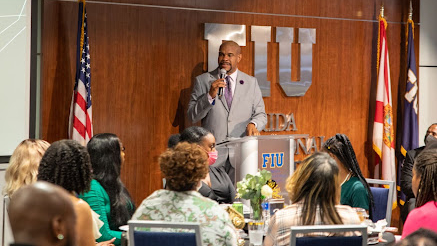Dioslyn Oliva | Staff Writer
Although I appreciate Black History Month, as an Afro-Latina, I want the month to acknowledge and celebrate other Black ethnic groups.
Over the past few decades, populations of Afro-Latinos, who are Black people from the Caribbean islands and Latin America, immigrated to the United States. This includes my parents who immigrated from Honduras, a Spanish speaking country in Central America.
This introduces the differences between race and ethnicity, two separate concepts that are often used interchangeably in conversation. It’s important to clarify that while race describes the physical characterizations of a group of people, ethnicity refers to a group of people who have shared cultural, traditional and familial bonds.
Similarly, Black and African-American are commonly used terms that may be confusing for some people; most Americans aren’t even aware that not all Black people in the U.S. are African-Americans. Other Black ethnic groups in the United States are overlooked because of this.
Black Hispanics, for example, are subject to racism and discrimination within the Hispanic community and are not properly appreciated.
I’ve had my fair share of racism from other Hispanics. This has made me believe that Black Hispanics are an afterthought in Hispanic celebrations.
Throughout middle and high school, I went to predominantly Hispanic schools with classmates that viewed me as the token Black girl. My overall experience at these schools was fine, but I’d occasionally dealt with racist and derogatory statements about Black people from my classmates.
Teachers rarely talked about or mentioned Black Hispanics and their presence in Hispanic culture — it felt isolating and it’s heartbreaking to know that some Hispanics don’t even consider us as members of the community.
It’s also important to note that not all Afro-Latinos necessarily speak Spanish, but other languages like Portuguese and Creole – something that is brushed aside in the United States. Even though Caribbean Heritage Month is recognized in the United States in June, barely anyone knows about it.
Which is why Afro-Latinos, Afro-Caribbeans and Africans should be celebrated during Black History Month. They are more than half of the Black immigrant population in the US and have also been significant to American history.
People like singer Rihanna and Vice President Kamala Harris, two Afro-Caribbeans, set an example of how influential they have been to the United States. For example, Rihanna from Barbados, who’s the wealthiest musician in the world, and Harris as the first female vice-president in our history, proudly represents her Jamaican heritage.
Black History Month, simply put, should commemorate all Black people. Teaching the American public about Black people from various places and ethnic backgrounds allows Americans to learn more about different Black cultures around the world.
I am a proud Black woman and Black History Month makes me feel empowered – something I wholeheartedly appreciate. Although we can celebrate and embrace our race year round, this month is special because it gives us recognition.
While there’s been progress in recent years, there’s definitely lots more work to do. Regardless, Black History Month should continue celebrating not just African American triumph, but all triumph brought by Black Americans. We all deserve to be recognized.
DISCLAIMER:
The opinions presented within this page do not represent the views of the PantherNOW Editorial Board. These views are separate from editorials and reflect individual perspectives of contributing writers and/or members of the University community.






Be the first to comment on "Black History Month should celebrate all Black cultures"